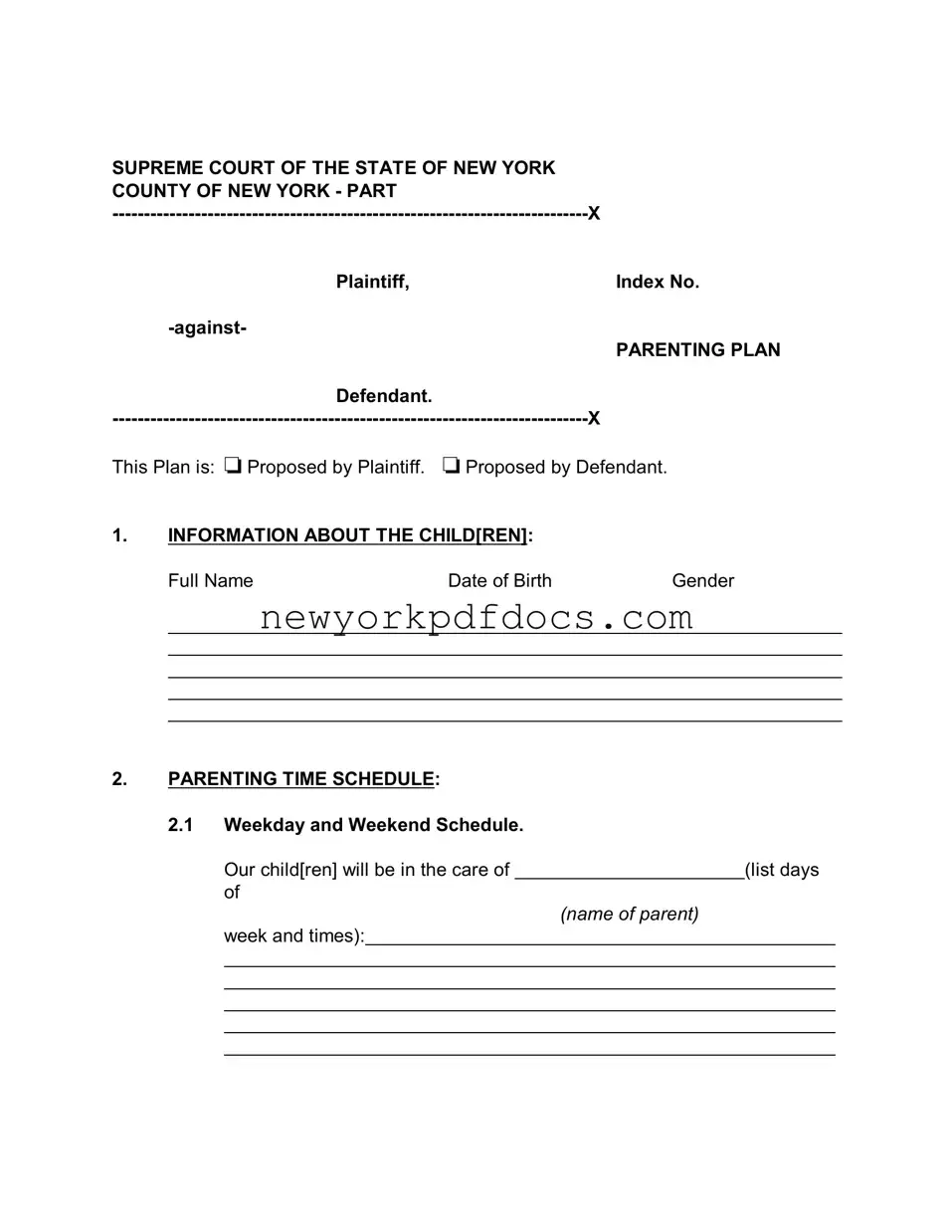SUPREME COURT OF THE STATE OF NEW YORK
COUNTY OF NEW YORK - PART
--------------------------------------------------------------------------- |
X |
Plaintiff, |
Index No. |
-against-
PARENTING PLAN
Defendant.
---------------------------------------------------------------------------X
This Plan is: Proposed by Plaintiff. Proposed by Defendant.
1.INFORMATION ABOUT THE CHILD[REN]:
Full Name |
Date of Birth |
Gender |
|
|
|
|
|
|
|
|
|
|
|
|
|
|
|
2.PARENTING TIME SCHEDULE:
2.1Weekday and Weekend Schedule.
|
Our child[ren] will be in the care of |
|
(list days |
|
of |
(name of parent) |
|
week and times): |
|
|
|
|
|
|
|
|
|
|
|
|
|
|
|
|
|
|
|
|
|
|
|
|
|
|
|
|
Our child[ren] will be in the care of |
|
(list |
days
(other parent’s name)
of week and times):
2.2Summer Schedule.
Choose One:
The schedule described above in Section 2.1 will continue throughout the summer except that
OR
The schedule for time with our child[ren] will be different during the summer than it is in the winter (describe below):
Our child[ren] will be in the care of |
|
(list |
(name of parent)
days of the week and times):
AND
Our child[ren] will be in care of |
|
(list days |
(other parent’s name)
of the week and times):
PARENTING PLAN REV 6/13 |
page 2. |
2.3Holiday Schedule.
The following holiday schedule will take priority over the regular weekday, weekend, and summer schedules discussed above. If a holiday is not specified as even, odd or every year with one parent, then our child[ren] will remain with the parent they are normally scheduled to be with.
Check One or Both:
When parents are using an alternating weekend plan and the holiday schedule would result in one parent having the child[ren] for three weekends in a row, the alternating weekend pattern will restart, so neither parent will go without having the child[ren] for more than two weekends in a row.
If a parent has our child[ren] on a weekend with an unspecified holiday or non-school day attached, they shall have our child[ren] for the holiday or non-school day.
Fill in the blanks below with the parent’s name to indicate where the child[ren] will be for the holidays. Provide beginning and ending times.
Holidays |
Even Years |
|
Odd Years Every Year |
Beginning/Ending Times |
Mother’s Day |
|
|
|
|
|
|
|
|
|
Father’s Day |
|
|
|
|
|
|
|
|
|
Thanksgiving |
|
|
|
|
|
|
|
For Thanksgiving, |
Christmas Eve |
|
|
|
|
|
|
|
Christmas Eve, |
|
|
|
|
|
|
|
Christmas, New |
Christmas |
|
|
|
|
|
|
|
Year’s Eve, and |
|
|
|
|
|
|
|
New Year’s, PROVIDE |
New Year’s Eve |
|
|
|
|
|
|
|
ADDITIONAL DETAILS |
|
|
|
|
|
|
|
BELOW in SECTIONS |
New Year’s |
|
|
|
|
|
|
|
2.4 and 2.5 |
|
|
|
|
|
|
|
|
|
Martin Luther |
|
|
|
|
|
|
|
|
|
King Day |
|
|
|
|
|
|
|
|
|
President’s Day |
|
|
|
|
|
|
|
|
|
PARENTING PLAN REV 6/13 |
page 3. |
Easter
Memorial Day
Fourth of July
Labor Day
Halloween
Veteran’s Day
Other:
2.4Thanksgiving. Details for sharing time with the child[ren] during this holiday are:
2.5Winter Break (Christmas, New Year’s, and School Vacation).
Choose One:
Our child[ren] will be in the care of each parent according to the schedule described in Section 2.1.
OR
Our child[ren] will spend half of Winter Break with each parent on a schedule that is consistent with the alternating holidays described above.
OR
Other: Details for sharing time with the child[ren] during Christmas Eve, Christmas Day, New Year’s Eve and New Year’s Day and school vacation are:
PARENTING PLAN REV 6/13 |
page 4. |
in even years. in odd years.
2.6Spring Break.
Choose One:
Our child[ren] will be in the care of each parent according to the schedule described in Section 2.1.
OR
Our child[ren] will alternate spending spring break with each parent (indicate which parent).
With
With
OR
Our child[ren] will spend half of spring break with each parent (provide details):
2.7Child[ren]’s Birthdays. Choose One:
Our child[ren] will be in the care of each parent according to the schedule described in Sections 2.1 and 2.2.
OR
Our child[ren]’s birthdays will be planned so that both parents participate in the birthday celebration.
OR
PARENTING PLAN REV 6/13 |
page 5. |
Our child[ren] will celebrate birthdays according to the following plan (indicate which parent has the child[ren], and any other important details.:
2.8Other Holiday and Vacations. Details for sharing time with the child[ren] during other holidays or vacation are:
2.9Number of Overnights.
Our schedule for sharing time with our child[ren] results in our child[ren]
|
|
|
|
|
|
|
|
|
spending |
|
|
overnights in the home of |
|
(name of |
one parent) and |
|
|
overnights in the home of |
|
|
|
(name of other parent). |
|
|
2.10Primary Residence (Optional).
We agree that our child[ren] shall primarily reside with (name of one parent).
We agree that neither residence shall be considered the “primary” residence.”
2.11Alternate Care (Optional).
We choose not to specify arrangements for alternate care.
Our arrangements for alternate care are:
PARENTING PLAN REV 6/13 |
page 6. |
2.12Temporary Changes to the Schedule.
Any schedule for sharing time with our child[ren] may be changed as long as both parents agree to the changes ahead of time in writing OR
verbally (choose one).
Activities scheduled during the other parent’s time must be coordinated with the other parent.
Makeup and Missed Parenting Time: Only substantial medical reasons will be considered sufficient for postponement of parenting time. If a child is ill and unable to spend time with a parent, a makeup parenting time will be scheduled. If a parent fails to have the child[ren] during their scheduled parenting time for any other reason, there will be no makeup of parenting time unless the parties agree otherwise in writing.
2.13Permanent Changes to the Schedule.
We understand that, once the judge signs the final judgment in our case and approves this Parenting Plan, any changes that we do not agree on can be made only by applying to the court and proving that there has been a “change in circumstance.”
Before applying to the court, we understand that we can agree to try to resolve our dispute through mediation or other means.
3.DECISION-MAKING:
3.1Day-to-Day Decisions.
Each parent will make day-to-day decisions regarding the care and control of our child[ren] during the time they are caring for our child[ren]. This includes any emergency decisions affecting the health or safety of our child[ren].
3.2.Major Decisions.
PARENTING PLAN REV 6/13 |
page 7. |

Major decisions include, but are not limited to, decisions about our child[ren]’s education, non-emergency healthcare, religious training, and extracurricular activities, including summer camp and the need for tutoring.
Choose One: |
|
|
(parent’s name) shall have sole |
decision-making authority on major decisions about our child[ren]. This arrangement is known by the courts as Sole Custody,
OR
Both parents will share in the responsibility for making major decisions about our child[ren]. This arrangement is known by the courts as Joint Custody.
AND |
(Choose One). |
|
|
|
(Parent’s name) shall always consult with the |
other parent prior to making major decisions. |
|
|
|
(Parent’s name) shall have the option to consult |
with the other parent prior to making major decisions.
OR
Other - - Describe how major decisions will be handled; including dividing the responsibility for major decisions between the parents according to each parent’s strengths/weaknesses:
4.INFORMATION SHARING:
Unless there is court order stating otherwise:
Both parents are entitled to important information regarding our child[ren]
PARENTING PLAN REV 6/13 |
page 8. |

including but not limited to, our child[ren]’s current address and telephone number, education, medical, governmental agency, psychological and law enforcement records.
Information about our child[ren]’s progress in school and any school activity is equally available to both parents. Both parents are encouraged to consult with school staff concerning our child[ren]’s welfare and education.
Both parents will immediately notify each other regarding any emergency circumstances or substantial changes in the health of our child[ren].
Both parents will provide each other with contact numbers and addresses and will notify each other of any change in that information within 72 hours of such a change. If either parent takes our child[ren] from their usual place of residence, they will provide the other parent with an emergency contact phone number.
5.RELOCATION OF A PARENT:
5.1Neither parent shall relocate outside his/her immediate vicinity without the prior permission of the other parent or an order of the court.
5.2Other:
6.PARENT-CHILD COMMUNICATION:
Choose One:
Both parents and child[ren] shall have the right to communicate by telephone, in writing or by e-mail during reasonable hours without interference or monitoring by the other parent.
OR
PARENTING PLAN REV 6/13 |
page 9. |
Procedures for telephone, written or e-mail access (describe how access will work):
7.EXCHANGE OF OUR CHILD[REN]:
7.1 Choose One:
Both parents will share equally in the responsibility of exchanging our child[ren] from one parent to the other while parents continue to reside in the same locale.
OR
Procedures for exchanging our child[ren] (provide details):
7.2Both parents shall have the child[ren] ready on time with sufficient clothing packed and ready at the agreed-upon time of the exchange.
All clothing that accompanied our child[ren] shall be returned to the other parent.
8.MUTUAL RESPECT:
Parents will not say things or knowingly allow others to say things in the presence of our child[ren] that would take away our child[ren]’s love and respect for the other parent.
9.OTHER TERMS:
Add any other items regarding the child[ren] you would like to include in your
PARENTING PLAN REV 6/13 |
page 10. |









